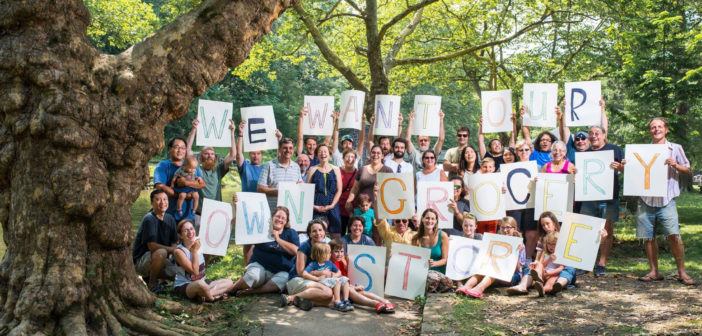Seven years ago, Colleen Marsh came across a flyer that raised the question, “Do you want a grocery store in downtown Bethlehem?”
A longtime North Bethlehem resident, Marsh was aware of the area’s classification as a food desert — or an urban area that has limited access to affordable and nutritious food. So, out of curiosity, she decided to attend the first meeting at the library.
More than a hundred people were in attendance. Enthusiasm permeated the room.
“There were three women at the front of the room that had a ‘How to Start a Food Co-op’ manual, which is produced by the Food Co-op Initiative,” Marsh said, “and they were going through it and talking about what the process would entail.”
Before long, she became increasingly involved with the effort.
Marsh, who is also an IT project manager at Moravian College, has now served as board chair of the Bethlehem Food Co-op for the past three years.
Co-ops are independent enterprises owned, operated and financed by their members. According to its mission statement, “The Bethlehem Food Co-op is a diverse community encouraging physical, social and economic health by providing healthful, affordable food; emphasizing local, sustainable, humane and natural food systems; and offering unique educational opportunities to the entire community.”
Marsh said many Bethlehem locals were affected when their neighborhood grocery stores fell to the competition created by supermarkets like Wegmans and Giant. This trend particularly disadvantaged members of the community for whom those stores are not easily accessible.
“There are people in this area, believe it or not, who do their grocery shopping at Sunoco (gas station), because they are not close to anything else, and transportation is an issue and money is an issue,” said LaKeisha Thorpe, a co-op board member and the assistant dean of graduate and adult studies at Moravian College. “So, we take for granted that we have these big, beautiful stores that open up in other parts of our area, but there are still people who are in a food desert.”
The Bethlehem Food Co-op was incorporated as a nonprofit cooperative in the state of Pennsylvania in 2013, and its members have been working toward creating a community grocery store in downtown Bethlehem ever since.
By paying a one-time $300 fee, co-op members essentially become co-owners of the store. The board has also introduced a scholarship and payment plan that enable lower-income households to become members.
As of March 2018, more than 480 households have joined the effort.
On average, it takes about five to seven years to start a co-op. The board expects to have approximately 600 member-owner households when they launch a capital campaign and find additional sources of funding to establish the physical store.
Though currently a majority of members are North Side residents, Marsh said the board aims to ensure that the co-op is not only accessible to all income levels, but also that there is adequate racial and ethnic representation. Its new community hubs initiative aims to find community pillars and hot spots to ensure all voices have the opportunity to be heard as the co-op develops.
When the co-op’s membership campaign began in July 2013, many early adopters were activists and locavores— people who are passionate about food justice or active in their communities.
Jennifer Dize, an assistant dean of students at Lafayette College and the co-chair of the board, and her wife Emily Hoffert, a board member and the general manager of the restaurant Jumbars, were drawn to the organization’s strong emphasis on community.
Dize said the co-op does its best to engage both aspects of membership — those who join for activist reasons and those who merely want a grocery store in their neighborhood.
As the organization hits formal milestones, such as hiring member recruitment coordinators or launching a real estate committee, more community members get on board.
Marsh said the membership recruitment has plateaued recently, however, as the board works behind the scenes.
“It’s been a while that people have been hearing our name, and people are sort of like, ‘Is this happening? When is this happening?’ and we can’t give a definite date just because there’s still so many variables,” Marsh said. “So I think that’s a continued challenge — to demonstrate that we are doing things that are of value to the community and that serve our community while also still concretely working toward opening a store.”
The board members are still in the process of finding an ideal location in either the downtown North or South side that suits their needs.
Dize said residents who are hesitating to join until they know where the store will be built should get involved so they can have a say in the matter.
“This really is a community effort,” she said. “If anyone is holding out, waiting to see what happens — the more involvement we have, whether that’s financially or through volunteer opportunities, one-time or ongoing — the sooner that we open.”
In addition to community members, many local politicians have been supportive of the effort. A majority of city council members have joined the co-op, as have Mayor Robert Donchez and Senator Lisa Boscola.
Last spring, the co-op board was invited to address Bethlehem’s committee on community and economic development. Marsh said Councilman J. William Reynolds called the co-op the “most important project” in town at the time, and Councilman Shawn Martell expressed hope that the grocery store will become a pillar of the community.
Kathy Fox, a North Side resident, said what motivated her to join the co-op were its emphases on environmental sustainability and community involvement.
“(By participating in a co-op) you are also really helping the local economy,” she said. “So you’re not sending your dollars out to the shareholders and corporations, or out to farmers from really far away when we have local farmers available.”
Since its inception, the co-op has engaged the community through a variety of initiatives.
The education committee offers classes, workshops and lectures to the Lehigh Valley community. It provides a variety of skills-oriented and educational programs, such as shopping seasonally on a budget, making sourdough bread or practicing urban composting.
Thorpe is one of the chairs of the education committee. Her doctoral research is grounded in the narratives surrounding food habits and pathways and their importance to people’s cultural identities.
In addition to expanding the various education programs that are already in place, Thorpe hopes to continue to encourage a transcultural approach to food by creating a cookbook lending library in the future grocery store.
Marsh said the co-op’s impact on the community was reflected during this year’s St. Patrick’s Day Parade on the South Side.
“I was expecting normal (applause) as we walked by and we tossed out candy,” she said. “But there were people along the parade route who were cheering, ‘We own it too!’”
Thorpe said it’s important to understand the co-op — and food in general — as a unifier for various communities.
“It’s the education aspect, the community aspect,” she said. “This is going to be more than just another grocery store.”






Comment policy
Comments posted to The Brown and White website are reviewed by a moderator before being approved. Incendiary speech or harassing language, including comments targeted at individuals, may be deemed unacceptable and not published. Spam and other soliciting will also be declined.
The Brown and White also reserves the right to not publish entirely anonymous comments.